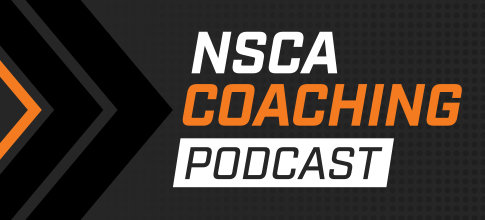NSCA’s Coaching Podcast, Episode 20: Michael Doscher
by Scott Caulfield and Michael Doscher
Coaching Podcast
December 2017
Michael Doscher from Valdosta State University talks to the NSCA Head Strength and Conditioning Coach, Scott Caulfield, about how to thrive for many years at one institution and work well with those around you, as well as how strength coaches should be evaluated.
Michael Doscher, CSCS, has served for 20-plus years as Speed, Strength, and Conditioning Coach at Valdosta State University. He has been honored for his work on several occasions, including in 2005, when he was named the College Strength and Conditioning Professional of the Year by the National Strength and Conditioning Association (NSCA). He followed that by being named the Samson National Collegiate Athletic Association (NCAA) Division II Strength and Conditioning Coach of the Year by American Football Weekly in 2007.
Find Scott on Twitter: @scottcaulfield
Show Notes
"Are wins and losses down to the weight room if progress is made in the weight room?” 2:06
“Are you coaching, are you hitting the right people, are you spending too much time with the kids that are doing it right and not enough time with those that are trying to hide?” 3:58
“Use informal evaluation more as a teaching tool than purely as an evaluation.” 5:25
“As a head guy, you have to humble yourself.” 5:44
“‘Understand what he’s trying to say’ when an athlete comes to you and tells you he would prefer you to treat him a certain way or do something a certain way.” 7:04
“I can’t be status quo if I want to make that one percent difference for our athletes and make them better.” 8:49
“I love what I do… but at the end of the day, it’s a great family spot.” 11:36
“‘Time and honesty… fighting the battles you should fight and compromising when you need to compromise’ when educating sport coaches.” 12:55
“Make them [sport coaches] always think it’s their idea… I don’t want the recognition. The kids should get the recognition.” 14:15
“Everybody I meet I try to learn something from.” 15:38
“When they leave you, they have to be their own person.” 16:16
“If you ‘gotta’ do something that’s not good; you have to ‘want to’ go do something.” 17:00
To his graduate assistants: “You’re going to learn a lot from me—you might learn some good stuff, but you’re also going to learn what not to do sometimes… and that’s more valuable sometimes than knowing what to do.” 17:57
“You learn more from failure than you ever do from successes.” 18:12
“Not every athlete loves to lift because he’s an athlete.” 20:20
“That’s what a true champion is—they work hard at things they don’t like to do.” 21:11
“People are people… at the end of the day, we’re all more similar than we are not.” 22:58
“You have to be intelligent to do what we do.” 29:03
“It’s not all just lifting.” 30:52
“Hire people smarter than you and stronger in your weaknesses.” 31:25
“You want to hire somebody for their next position.” 32:22
Number one reason people fail: “Ego.” 33:30
Reporting Errors: To report errors in a podcast episode requiring correction or clarification, email the editor at publications@nsca.com or write to NSCA, attn: Publications Dept., 1885 Bob Johnson Dr., Colorado Springs, CO 80906. Your letter should be clearly marked as a letter of complaint. Please (a) identify in writing the precise factual errors in the published podcast episode (every false, factual assertion allegedly contained therein), (b) explain with specificity what the true facts are, and (c) include your full name and contact information.
- Privacy Policy
- Your Privacy Choices
- Terms of Use
- Retraction and Correction Policy
- © 2026 National Strength and Conditioning Association
